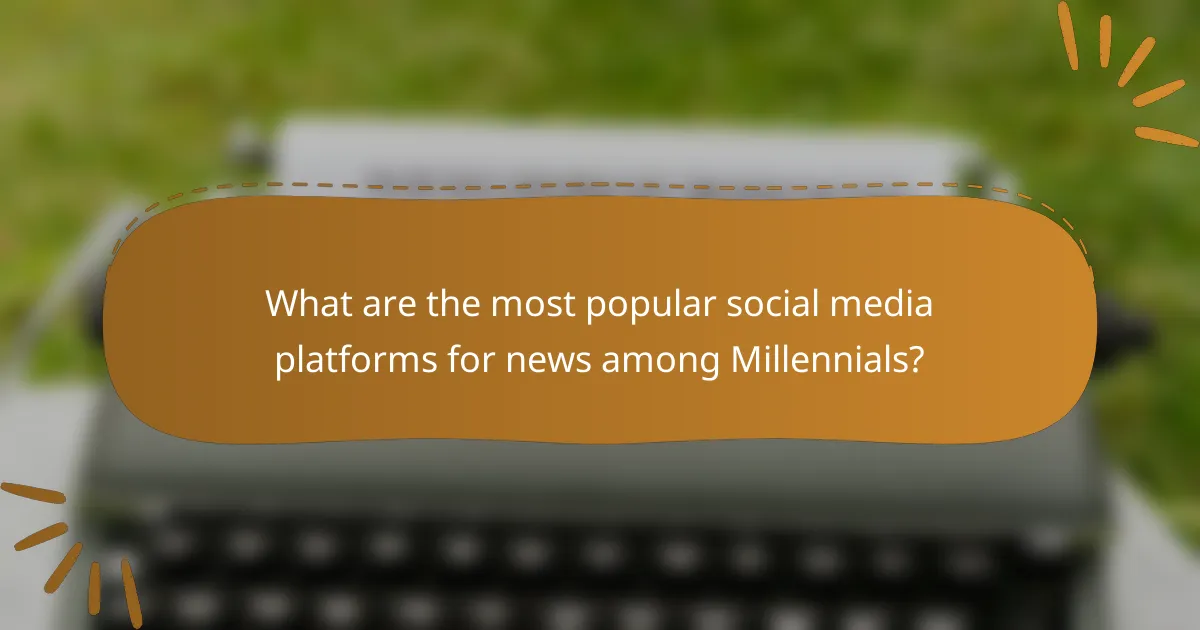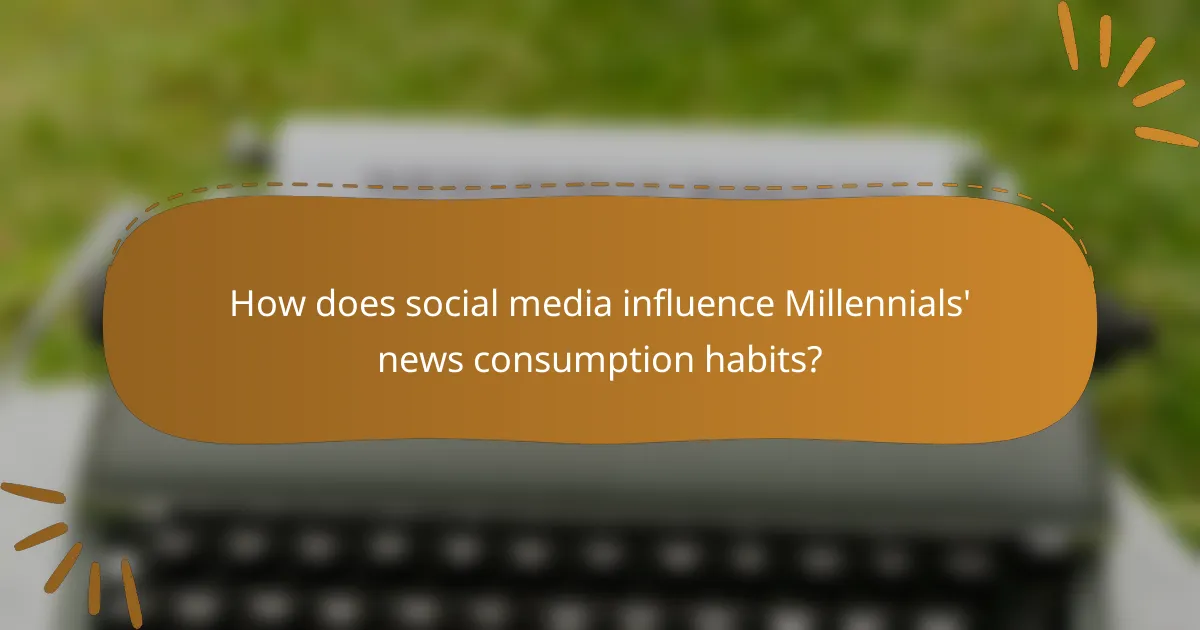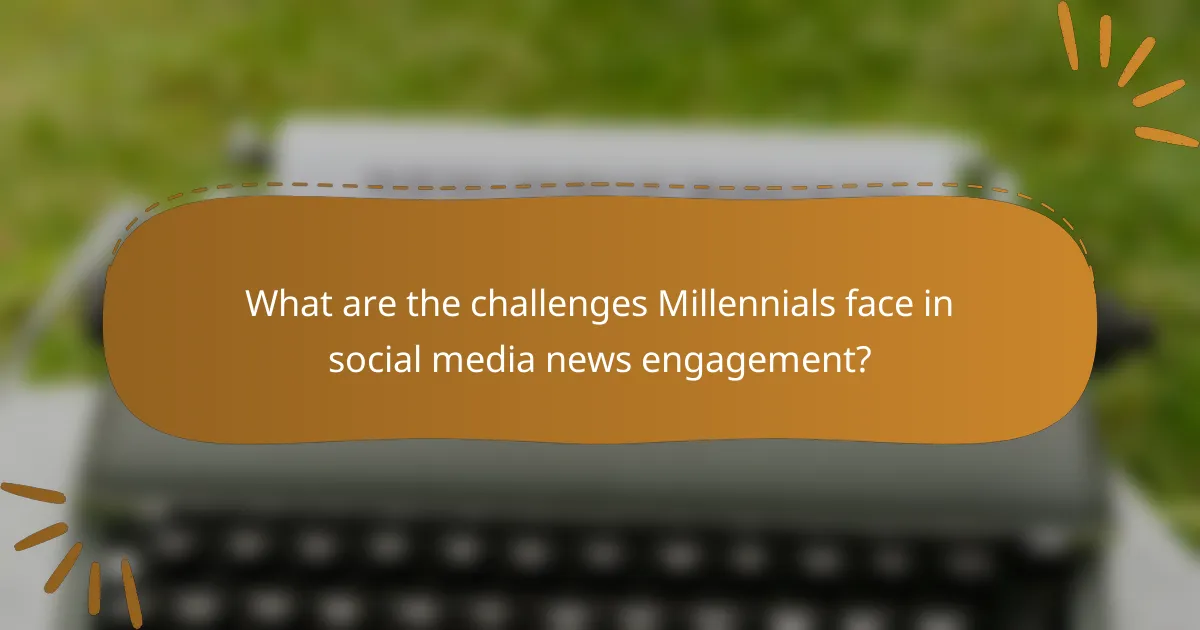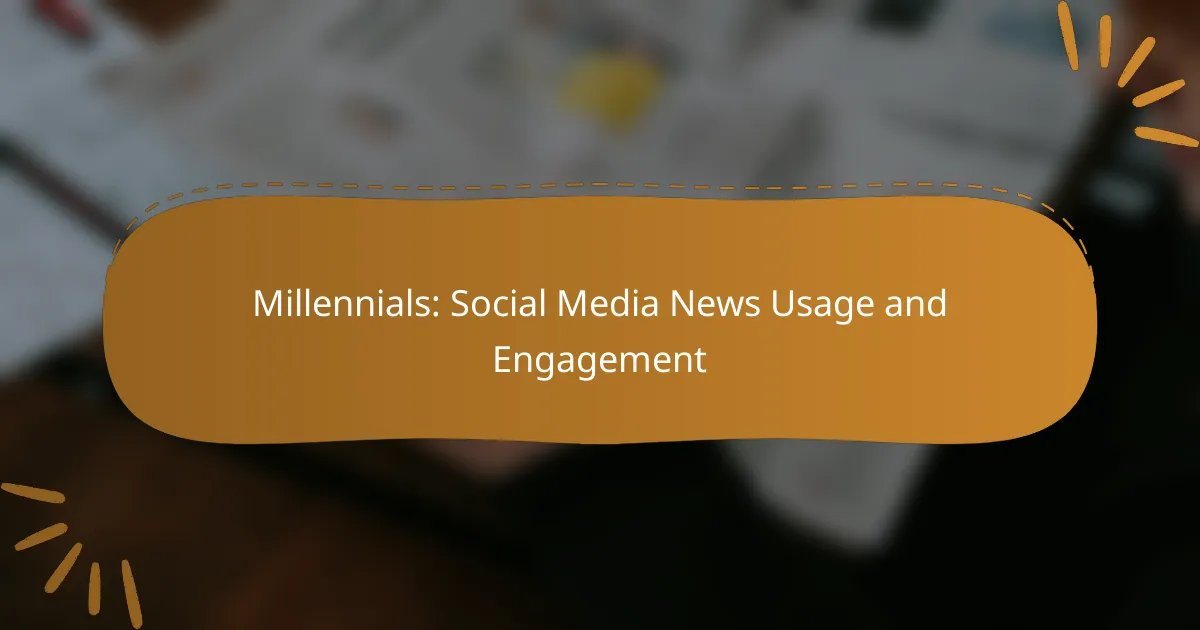Millennials in the United States increasingly turn to social media for news, favoring platforms like Instagram, Facebook, and TikTok for their quick and engaging content. This generation values visual storytelling and instant access to diverse perspectives, often prioritizing convenience and entertainment over traditional news formats. As a result, social media has become a pivotal tool in shaping their news consumption habits.

How do Millennials use social media for news in the United States?
Millennials in the United States primarily use social media platforms to access news, favoring channels that provide quick and engaging content. They often seek out news through platforms like Instagram, where visual storytelling captures their attention more effectively than traditional news formats.
High engagement on platforms like Instagram
Instagram has become a key platform for Millennials to engage with news, thanks to its visually driven content. Users often follow news outlets and journalists who share stories through eye-catching images and short videos, leading to higher interaction rates compared to text-heavy articles.
This engagement is further amplified by features such as Stories and Reels, which allow for real-time updates and behind-the-scenes looks at news events. As a result, Millennials are more likely to share and discuss news content that resonates with them on these platforms.
Preference for video content over text
Millennials show a strong preference for video content when consuming news, as it offers a more dynamic and engaging experience. Short clips and live broadcasts can convey complex stories quickly, making them more appealing than lengthy articles.
Platforms like TikTok and YouTube have gained popularity among this demographic for news consumption, where bite-sized videos summarize current events. This trend suggests that news organizations should focus on creating concise, visually engaging video content to reach this audience effectively.
Reliance on peer recommendations
Millennials often rely on peer recommendations for news, trusting the opinions of friends and influencers over traditional media sources. This social validation influences their news consumption habits, as they are more likely to engage with content shared by people they know.
To leverage this trend, news outlets can encourage sharing and discussions on social media by creating shareable content that resonates with their audience. Engaging with followers through comments and direct messages can also foster a sense of community and trust around news topics.

What are the most popular social media platforms for news among Millennials?
Millennials predominantly use platforms like Facebook, Twitter, and TikTok for news consumption. Each platform serves unique purposes, catering to different aspects of news engagement, from in-depth articles to quick updates and entertaining content.
Facebook as a primary news source
Facebook remains a leading platform for Millennials seeking news, with many users following news organizations and journalists. The platform’s algorithm often prioritizes posts from these sources, making it easier for users to access relevant news articles and updates.
However, users should be cautious about misinformation, as the platform has faced criticism for the spread of false news. Engaging with trusted pages and verifying sources can help ensure the accuracy of the information consumed.
Twitter for real-time updates
Twitter is favored by Millennials for its immediacy, allowing users to receive real-time news updates and engage in conversations. The platform’s character limit encourages concise reporting, making it ideal for breaking news and live events.
To make the most of Twitter for news, follow reputable accounts and utilize lists to organize different news sources. This can help filter out noise and focus on the most relevant updates.
TikTok for news entertainment
TikTok has emerged as a unique platform where Millennials consume news in a more entertaining format. Short videos often summarize current events, making complex topics more accessible and engaging.
While TikTok can be a fun way to stay informed, users should cross-reference information with traditional news sources to ensure accuracy. Following credible creators who focus on news content can enhance the reliability of the information received.

How does social media influence Millennials’ news consumption habits?
Social media significantly shapes Millennials’ news consumption by providing instant access to a wide range of information and diverse perspectives. This generation increasingly relies on platforms like Facebook, Twitter, and Instagram to stay informed, often prioritizing convenience and engagement over traditional news sources.
Increased exposure to diverse viewpoints
Social media enables Millennials to encounter a variety of opinions and narratives that they might not find in conventional media. This exposure can foster a more comprehensive understanding of issues, as users are often presented with content from different political and cultural backgrounds.
However, this diversity can lead to the challenge of misinformation, as not all viewpoints are equally credible. Millennials should critically evaluate sources and seek out reputable news outlets to balance their perspectives.
Impact of algorithms on news visibility
Algorithms play a crucial role in determining which news stories appear in Millennials’ feeds, often prioritizing content that aligns with their interests and past behaviors. This can create echo chambers, where users are predominantly exposed to information that reinforces their existing beliefs.
To mitigate this effect, Millennials should actively seek out diverse sources and engage with content that challenges their viewpoints. This practice can help ensure a more balanced news diet and reduce the risk of being misled by biased information.
Shift towards personalized news feeds
Personalized news feeds cater to Millennials’ preferences, allowing them to receive updates on topics they care about most. This customization enhances user engagement but can also limit exposure to broader news coverage.
Millennials should be mindful of the potential downsides of personalization, such as missing out on important news outside their usual interests. Regularly exploring different news categories and following a variety of sources can help maintain a well-rounded understanding of current events.

What are the challenges Millennials face in social media news engagement?
Millennials encounter several challenges in engaging with news on social media, primarily due to the overwhelming amount of information and the presence of misinformation. These obstacles can hinder their ability to access reliable news and make informed decisions.
Information overload and misinformation
Millennials often experience information overload as social media platforms continuously present a vast array of news articles, videos, and posts. This constant influx can lead to confusion and difficulty in discerning credible information from sensationalized content.
Misinformation is prevalent on social media, with false narratives and misleading headlines frequently shared. This can create a distorted view of current events, making it essential for Millennials to develop critical thinking skills to evaluate the accuracy of the news they consume.
Difficulty in verifying sources
Verifying the sources of news on social media can be challenging for Millennials due to the rapid pace at which information spreads. Many users may not take the time to check the credibility of a source before sharing, leading to the proliferation of unverified content.
To combat this issue, Millennials should look for established news organizations or fact-checking websites when encountering unfamiliar sources. Utilizing tools like browser extensions that flag unreliable sites can also help in ensuring the news consumed is trustworthy.
Privacy concerns with data sharing
Privacy concerns are a significant challenge for Millennials when engaging with news on social media. Many platforms collect personal data to tailor content, which can lead to apprehension about how that information is used and shared.
Millennials should be cautious about the information they share online and consider adjusting privacy settings on their social media accounts. Familiarizing themselves with the platform’s data policies can also provide insight into how their data is handled, enabling more informed choices about their engagement with news content.

What criteria do Millennials use to evaluate news sources on social media?
Millennials typically evaluate news sources on social media based on trustworthiness, content quality, and reporting standards. They prioritize credible sources that provide accurate, well-researched information and engage with their audience effectively.
Trustworthiness of the source
Trustworthiness is a critical factor for Millennials when assessing news sources. They often look for established media organizations with a history of reliability, as well as sources that are transparent about their editorial processes. Peer recommendations and user reviews also play a significant role in shaping their perceptions of trust.
To determine trustworthiness, Millennials may check for indicators such as verified accounts, the presence of fact-checking labels, and the source’s adherence to journalistic standards. They tend to favor sources that have been recognized by reputable journalism organizations.
Quality of content and reporting
The quality of content and reporting is essential for Millennials, who seek well-written articles that provide in-depth analysis and diverse perspectives. They appreciate sources that offer original reporting rather than mere aggregation of information. Engaging storytelling and multimedia elements can enhance their experience and encourage sharing.
Millennials often evaluate content quality by looking for clear citations, expert opinions, and balanced viewpoints. They are more likely to trust articles that include data from credible studies or interviews with knowledgeable sources, as these elements contribute to a more comprehensive understanding of the news topic.
